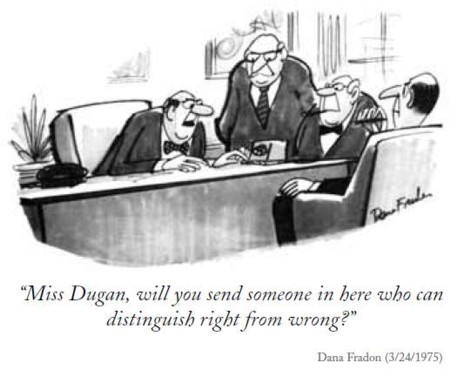Good and Bad
Always do right. This will gratify some people and astonish the rest[77].
***
When I'm good I'm very very good, but when I'm bad I'm better.[78]
Ethics describes the rules by which we decide between good and bad. Though it is probable that societies can only operate when some common basic rules apply, some ethical ideas vary a lot between cultures. We do not generally approve of eating people, for example.
If you study ethics, you may be asked: 'would it be possible to be bad or immoral if you were alone on a desert island?' You might reply that it would be bad to deliberately harm yourself or you might think it would be bad to damage other animals or plants. But suppose that you knew for certain that the Earth was about to be destroyed by a collision with another planet or a black hole or the Sun exploding. Is there anything you could do that would be bad just before everything, including the environment, was destroyed?
I think not. But as soon as there is an animal to be cruel to or another person to hurt or enslave or steal from you can be increasingly bad. So ethics is how we relate to others in our culture and a process of natural selection, to support that culture in its present form, has evolved its ethical rules.
Of course a religious person might say that to lose faith or to fail to praise or honour God would be bad, even for the last person left alive.
Over the centuries a vast amount of intellectual time has been dedicated to this subject and I do not intend to make it central to this essay. I would not do it justice in a dozen such. But it is tangential to almost every other topic I am covering; and you need to think about it. For example, if we have no freewill are we responsible for the evil, or good, we do?
In biology success is good; failure is bad; and so the good (not the meek) will inherit the earth. Of course they will not be human (we will be long gone). So maybe it is not good? The same applies in the marketplace. Success is proof of worth, failure of worthlessness. These kinds of goodness are fleeting. There is always another to successfully succeed.
You will hear some naïve theologians of an evangelical bent who feel that ethics is mainly about listing ways that you can be bad or immoral or sinful. But, as Jesus taught in the 'sermon on the mount', it is not sufficient or even necessary to be 'without sin'; you have to be trying to be good (free of thought crime – in Big Brother[79] terms).
To decide your own moral standards, rather than dwelling on sin, which is often culturally variable (like eating pork, blaspheming, showing your ankles, abortion or capital punishment), it is more useful to list the qualities of goodness in people; qualities that you would like to have.

For me, good qualities include honesty, trustworthiness, wisdom, compassion, courage, perseverance, creativeness, knowledge and a sense of humour. Good behaviours these lead to include, helping others, standing up for what seems right, being truthful and reliable (and good company) and trying to understand and improve the world.
These are the kind of qualities that are admired in every culture because these are the glue that keeps societies functioning. Because your ideas and values have evolved in our culture, if you follow your own ideas about what is right (sometime called your conscience) you will like yourself and be admired by others. You will be thought to be a good person.
What is wrong or bad is a bit more complicated. You could say it is the opposite of the qualities you believe are good. But sometimes people can't help being stupid or dull or wrong or uncaring. We wouldn't want to say this was being bad or evil.
In the book, and the more optimistic movie, The Cider House Rules[80] Irving presents us with abortion, adultery, incest, 'grand lies', forgery, racial issues and other violations of rules and norms; yet the characters committing these 'crimes' are not driven by malice. We sympathise with these people few of whom are 'bad'. It's just that they have no better ('gooder') options. At the end, the real rules of a 'good' life are just too hard to draft in any universal form.
To try to resolve this we have evolved laws that list the ways a person can clearly be bad and in what context (eg its unlawful to deliberately kill someone; unless you are a soldier or a hangman, or sometimes, defending yourself or a loved one).
Yet we don't believe that someone is good or admirable just because they obey the law and we might not always agree that someone who breaks a law is bad.
In Australia we are trying to build a better society with one of the greatest levels of ethnic and cultural diversity in the world. To succeed, it is essential that we build on our common ground of what is good. It is most important that we do not let individual ideas about sin or what is wrong; ideas that are not shared by everyone; hold sway. To that extent we all need to give up a bit of our culture for the common good.

